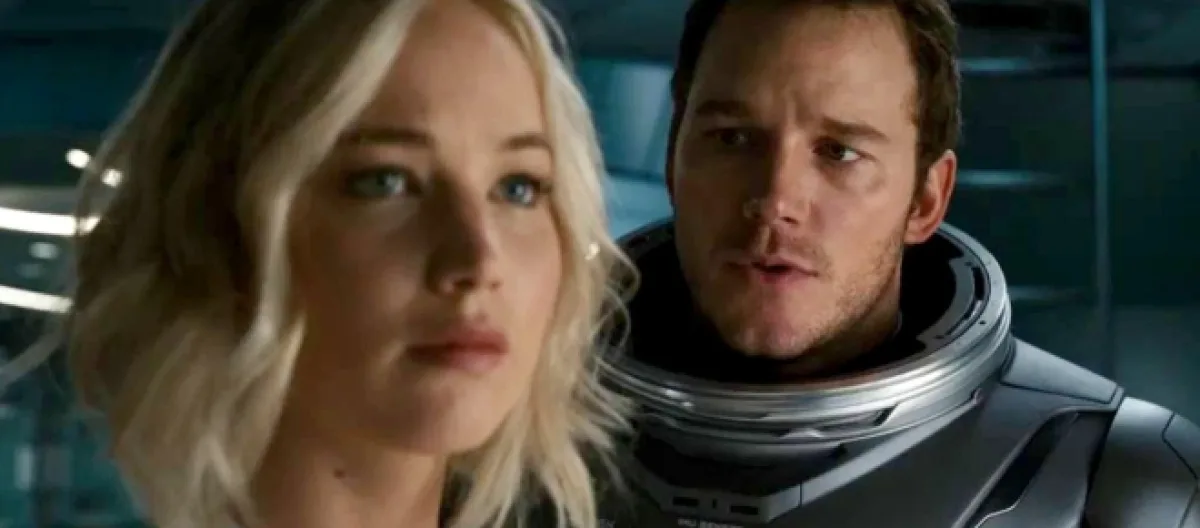The point of departure of this science fiction is very interesting. On board of a spacecraft transporting humans to life on another planet, a man and a woman wake up in the middle of the journey and they still have 90 years to live - and die - on the way. How can two people occupy their entire lives isolated from society? How are they going to try to interact with the people on Earth?
What would have made our planet less interesting than others in the solar system? Which people are able to pay for this trip, and what are they looking for in the new destination?
'Passengers' lost in space
It is a pity that "Passengers" does not respond satisfactorily to any of these questions. For a 120-minute movie and only two characters on the scene, it's amazing how difficult it is to develop the psychology of each one of them. We know that Jim (Chris Pratt) works as a mechanic and Aurora (Jennifer Lawrence) works as a writer. We do not know very well their tastes, their past, their relationship with Earth and with friends, family, or lovers.
For this reason, it is difficult to identify with them and hope for them to solve the problem. When Sandra Bullock was lost in space in Gravity, when Baymax shifted into another dimension in "Big Hero 6," and when Tom Hanks got separated from his friend Wilson in Cast Away, we suffered for them. But when Jim leaves aimlessly to space, the only concern is that the narrative ends for the lack of characters.
The distributors of this project must have realized the absence of a major conflict, casting then the essential doubt of the reason why they would have woken up so early. Would it be a deliberate sabotage of the ship's captains? Not at all. The reason is explained in the beginning, in a banal, anticlimactic way.
The perverse ethical implications of this revelation are abandoned in favor of a love story: a handsome and kind man meets a beautiful and kind girl and they both fall in love, because there is not much left to do in 90 years of closure. The plot suggests that love is stronger than ethics, and the ends justify the means.
Warning: possible spoilers below.
If the human aspect is badly resolved, at least the images and the futuristic conception could impress. However, the technological imagery presented by director Morten Tyldum in "Passengers" is rather poor: the touch screen function of the displays is enough to get everything from fresh food to a complex heart surgery. At the same time, an email takes fifteen years to get to Earth, and a tree can be planted on the steel floor of a meteor-proof spacecraft.
The conception of human advances is so uneven that it led some spectators to laugh during the session exhibited to the press. The scenes seem to have been designed individually, according to the necessity of the moment: when Jim and Aurora find themselves in an impasse, the script simply introduces a third human being, responsible for delivering valuable information before disappearing. More accessory than that, impossible.
Finally, the result reveals a rushed script, which would require more treatments before reaching the screen, as well as a bad mix of genres. For a science fiction blockbuster, the narrative is slow and lacks in tension. For a romance between two Hollywood sweethearts, there is no real reason for them to be attracted for each other, besides loneliness and a plausible response to the Stockholm Syndrome portrayed in the plot.
For a comedy, it lacks the work of time, the speed of dialogues and scenes. For a drama, it is necessary to develop the issues of the society around them, the correspondence with people on Earth, the elements that Jim and Aurora gave up for this trip. Chris Pratt and Jennifer Lawrence struggle to make the project plausible – especially her, who performed really well - but it's no use when Tyldum is more interested in solving engineering issues than deepening the relationship between the only two humans on the scene.
